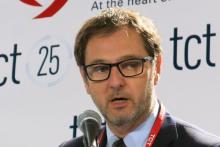User login
ACC Late-Breaking Clinical Trial sessions preview for day 1
Practice-changing science will mark the five Late-Breaking Clinical Trial sessions at the annual meeting of the American College of Cardiology being held in Orlando, March 10-12, according to the meeting’s vice chair, Andrew Kates, MD.
Saturday’s session, held jointly with the Journal of the American College of Cardiology following the Opening Session, will be held from 9 a.m. to 10 a.m. in the Main Tent (Hall C).
ODYSSEY OUTCOMES
This will be the second cardiovascular outcomes trial of a proprotein convertase subtilisin/kexin type 9 inhibitor to report its primary outcomes. Last year’s blockbuster FOURIER trial results showed that the PCSK9 inhibitor evolocumab significantly reduced cardiovascular events in patients with stable atherosclerotic cardiovascular disease who were still at residual risk based on elevated LDL cholesterol levels.
ODYSSEY Outcomes: Evaluation of Cardiovascular Outcomes After an Acute Coronary Syndrome During Treatment with Alirocumab trial looks at similar outcomes but in a post–acute coronary syndrome population.
“How it influences our practices and how it affects guidelines will depend on the data presented, and the strength of the data will really help us decide just where it fits in to clinical practice,” said Dr. Kates, a professor of medicine and the director of the cardiology fellowship program at Washington University in St. Louis.
VEST
The VEST Prevention of Early Sudden Death trial explores the hypothesis that wearable cardioverter defibrillators can impact mortality by reducing sudden death in the first 3 months after a heart attack in patients at high risk for life-threatening arrhythmias. This is a vulnerable period for these patients because they don’t yet meet guidelines for receiving implantable cardioverter defibrillators.
These eagerly awaited results, to be presented by Jeffrey E. Olgin, MD, will certainly influence clinical practice, Dr. Kates concluded.
Practice-changing science will mark the five Late-Breaking Clinical Trial sessions at the annual meeting of the American College of Cardiology being held in Orlando, March 10-12, according to the meeting’s vice chair, Andrew Kates, MD.
Saturday’s session, held jointly with the Journal of the American College of Cardiology following the Opening Session, will be held from 9 a.m. to 10 a.m. in the Main Tent (Hall C).
ODYSSEY OUTCOMES
This will be the second cardiovascular outcomes trial of a proprotein convertase subtilisin/kexin type 9 inhibitor to report its primary outcomes. Last year’s blockbuster FOURIER trial results showed that the PCSK9 inhibitor evolocumab significantly reduced cardiovascular events in patients with stable atherosclerotic cardiovascular disease who were still at residual risk based on elevated LDL cholesterol levels.
ODYSSEY Outcomes: Evaluation of Cardiovascular Outcomes After an Acute Coronary Syndrome During Treatment with Alirocumab trial looks at similar outcomes but in a post–acute coronary syndrome population.
“How it influences our practices and how it affects guidelines will depend on the data presented, and the strength of the data will really help us decide just where it fits in to clinical practice,” said Dr. Kates, a professor of medicine and the director of the cardiology fellowship program at Washington University in St. Louis.
VEST
The VEST Prevention of Early Sudden Death trial explores the hypothesis that wearable cardioverter defibrillators can impact mortality by reducing sudden death in the first 3 months after a heart attack in patients at high risk for life-threatening arrhythmias. This is a vulnerable period for these patients because they don’t yet meet guidelines for receiving implantable cardioverter defibrillators.
These eagerly awaited results, to be presented by Jeffrey E. Olgin, MD, will certainly influence clinical practice, Dr. Kates concluded.
Practice-changing science will mark the five Late-Breaking Clinical Trial sessions at the annual meeting of the American College of Cardiology being held in Orlando, March 10-12, according to the meeting’s vice chair, Andrew Kates, MD.
Saturday’s session, held jointly with the Journal of the American College of Cardiology following the Opening Session, will be held from 9 a.m. to 10 a.m. in the Main Tent (Hall C).
ODYSSEY OUTCOMES
This will be the second cardiovascular outcomes trial of a proprotein convertase subtilisin/kexin type 9 inhibitor to report its primary outcomes. Last year’s blockbuster FOURIER trial results showed that the PCSK9 inhibitor evolocumab significantly reduced cardiovascular events in patients with stable atherosclerotic cardiovascular disease who were still at residual risk based on elevated LDL cholesterol levels.
ODYSSEY Outcomes: Evaluation of Cardiovascular Outcomes After an Acute Coronary Syndrome During Treatment with Alirocumab trial looks at similar outcomes but in a post–acute coronary syndrome population.
“How it influences our practices and how it affects guidelines will depend on the data presented, and the strength of the data will really help us decide just where it fits in to clinical practice,” said Dr. Kates, a professor of medicine and the director of the cardiology fellowship program at Washington University in St. Louis.
VEST
The VEST Prevention of Early Sudden Death trial explores the hypothesis that wearable cardioverter defibrillators can impact mortality by reducing sudden death in the first 3 months after a heart attack in patients at high risk for life-threatening arrhythmias. This is a vulnerable period for these patients because they don’t yet meet guidelines for receiving implantable cardioverter defibrillators.
These eagerly awaited results, to be presented by Jeffrey E. Olgin, MD, will certainly influence clinical practice, Dr. Kates concluded.


